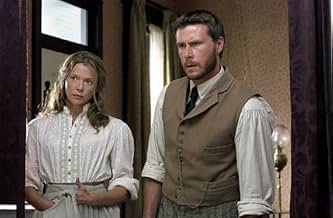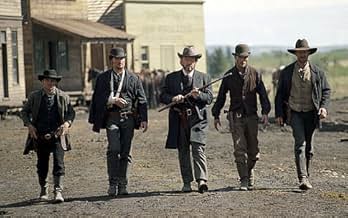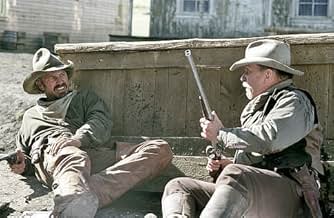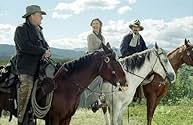Open Range
- 2003
- Tous publics
- 2h 19min
Un ancien as de la gâchette est obligé de reprendre les armes lorsqu'un avocat corrompu le menace ainsi que son équipage.Un ancien as de la gâchette est obligé de reprendre les armes lorsqu'un avocat corrompu le menace ainsi que son équipage.Un ancien as de la gâchette est obligé de reprendre les armes lorsqu'un avocat corrompu le menace ainsi que son équipage.
- Récompenses
- 1 victoire et 5 nominations au total
Patricia Stutz
- Ralph's Wife
- (as Pat Stutz)
Diego Diablo Del Mar
- Ballester
- (as Diego Del Mar)
Histoire
Le saviez-vous
- AnecdotesOriginally, Touchstone Pictures had Kevin Costner top-billed over Robert Duvall, but Costner asked the studio to top-bill Duvall instead.
- GaffesCharlie fires 16-17 rapid fires shots from one single-action, six-shot revolver - without reloading. In fact, during the first volley, he fires four random shots and then actually "fans" the revolver and fires ten additional shots into a bad-guy gunslinger in less than seven seconds, without changing weapons or re-loading. And then fires a few more rounds at still standing gun-men. Costner admitted in an interview for this film that he has always wanted to film a scene where he fans a six-gun way over the realistic amount of shots, and that this scene was indeed very enjoyable to make.
- Citations
Sue Barlow: I don't have the answers, Charley. But I know that people get confused in this life about what they want, and what they've done, and what they think they should've because of it. Everything they think they are or did, takes hold so hard that it won't let them see what they can be.
- Versions alternativesAMC version severely edits Butler's death. The sound of the gunshot that kills him is played at a lower volume, and the scenes of him falling back is sped up, so as to avoid showing the hole in his head from the shot.
- Bandes originalesHolding All My Love for You
Written by Michael Kamen (BMI) and Julianna Raye (BMI)
Performed by Julianna Raye
Produced by James Harrah
(P) (C) K-Man Corp. (BMI) / Ziffy Music, Inc. (BMI) / Open Range Productions USA, Inc. (BMI)
Commentaire à la une
Costner's third film as a director, his fourth if you include his work with Kevin Reynolds on Waterworld (1995), is another Western. One says 'another', but upon reflection it is obvious that it's a genre that, creatively, he's hardly left. After the highly successful Dances With Wolves (1990) he directed with Kevin Reynolds - albeit in uncredited fashion - the critically mauled The Postman (1997). The latter was nothing less than a reworking of the familiar Pony Express story, and for good measure threw in explicit references to John Ford along the way. Waterworld's ocean setting did nothing to disguise the fact that that was a film that owed another massive debt to the great American genre: sea fort, lone riders, wide-open watery frontier and all. Costner also did sterling work as Wyatt Earp in Kasdan's 1994 film of the same name - a substantial project, and one close enough in manner to his own to suggest more than a passing creative influence from its star.
In Open Range, Costner again has the lead: as Charley Waite, former gunfighter, now sharing ownership of a free grazing cattle drive. Together with Boss Spearman (Robert Duvall), and two others they reach Harmonville where they soon encounter a corrupt town Marshal (James Russo) and rancher (an excellent Michael Gambon) who threaten their way of life. They also discover others who prove sympathetic to their cause, like the sister of the town's doctor Sue Barlow (Annette Bening). There's growing suspense as an inevitable showdown looms ("Men are gonna get killed here today, Sue, and I'm gonna kill 'em...") Waite's personal life, and his romance gradually comes to the fore until its crisis, as well as the combat, mark the end of the film.
On screen Costner shares equal honours with the septuagenarian Robert Duvall, whose personal philosophy that "Man's got a right to protect his property and his life, and we ain't gonna let no rancher or his lawman take either," informs much of the main action. Crusty and fearsome, Spearman's dauntless words recall those of John Wayne's J.B. Books in The Shootist (1976) who expressed broadly similar sentiments: "I won't be wronged. I won't be insulted. I won't be laid a-hand on. I don't do these things to other people, and I require the same from them." In either case its an old man speaking, one fiercely independent after a life of hardship and who won't be trifled with. Open Range takes its main impetus from exactly that sort of unwelcome interference, and resembles Eastwood's Unforgiven in that a good deal of the narrative consists of a determined settling of accounts, an unrelieved search for moral recompense outside the law after an initial trespass against the innocent. What is started almost casually is finished deliberately and by the authority given the wronged: "Ours ain't writ by no tin star, bought and paid for, Marshall. It's writ by us, and we aim to enforce it," says Boss. Like Eastwood's film, Open Range also features a retired gunman who has recourse to his skills to help salvage a situation, and some of the best scenes with Costner's character concern his dispassionate and professional preparation for gunplay. Like William Munny before, Charley Waite has something of an avenging angel about him, whose cold consideration of his trade is filmed completely without irony.
Open Range has all the hallmarks of Costner the western auteur: an expansive, almost leisurely tone, supporting roles for loyal canines, a certain solemnity and respect for his conservative cinematic predecessors being foremost amongst them. As others have said, Costner directs as if Peckinpah and Leone had never existed, and the present work is no exception. Characteristically, it contains none of the self-indulgent nostalgia or cynicism common in the genre since the 1960s. Despite a visual quote from The Wild Bunch (1969) for instance, as men take their long walk abreast to the confrontation, the final shootout of Open Range owes far more to the traditional showdown of Gunfight At The OK Corral (1957) than the apocalyptic finale of Peckinpah's masterpiece. Slow burning, character driven and ruminative, Costner's latest has been criticised by some for its too-deliberate narrative pacing. For an MTV-generation viewing audience, unused to an older, more leisurely way of showing things, such issues are understandable, although no one used to a filmmaker taking his time to tell a good story will complain. Indeed, part of the great success of Open Range is the way it single-mindedly sustains an atmosphere of fateful suspense.
One thing that no one disputes: Duvall is magnificent in his part, a performance that may well prove a capstone to a long and prestigious career. Costner apparently had the actor in mind for the part from the first, a decision justified entirely and one of the highlights of the film. In fact if the film's has a weakness it can be put down to that fact that Spearman holds the stage so successfully, and for so long. Waite's own romance, starting so tentatively, is somewhat overshadowed by the more urgent prerogatives of his partner and when it finally flowers, it leads to some scenes which could have, with prudence been cut back to greater effect. Having said that, Costner's awkward farewell to Miss Barlow, saying so much with so little, just before the fight begins, is another memorable scene where sentimentality is kept happily at bay. It is once the violence is over, and the great tension is dissipated, that matters are drawn out a little too much. A little stoicism might have led to a more memorable close.
Like many good westerns, Open Range's central concerns lie around personal freedom and moral rectitude - the balance between which gives a good deal of the narrative its necessary tension. Like crossing the flood, which pours down the main street of Harmonville, the participants have to choose one side or the other. It's a film ultimately less about a gunfighter settling down, than of how men abide their self-justified actions. In the disc extras, Costner draws an illuminating parallel between the scene in his film in which Spearman and Waite confront the jayhawkers and The Oxbow Incident. In Wellman's 1943 classic, a rushed lynching leads to a disastrous error and mutual guilt. In Costner's film, to whom guilt is assigned is never in doubt, and indeed Spearman initially has to hold Waite back from overstepping the mark - an action which he comes to regret. "I never had any problem with killing," says Waite at one point. Like Eastwood's Munny, once justified he seeks stark retribution without compunction.
There's only one gunfight in Open Range, but it is worth the wait. Spread out almost as leisurely as the rest of the film, Costner and his cinematographer James Muro use a range of shots throughout the violent events to achieve effects both chaotic and planned at the same time. (Incidentally for a filmmaker who prides himself on accuracy, Costner has his hero 'fan' off shots, a notoriously inaccurate way of discharging a gun, but that's a minor distraction.) It's a notable confrontation, an extended set piece sequence that is one of the director's best and confirms his film the finest western since Unforgiven.
In Open Range, Costner again has the lead: as Charley Waite, former gunfighter, now sharing ownership of a free grazing cattle drive. Together with Boss Spearman (Robert Duvall), and two others they reach Harmonville where they soon encounter a corrupt town Marshal (James Russo) and rancher (an excellent Michael Gambon) who threaten their way of life. They also discover others who prove sympathetic to their cause, like the sister of the town's doctor Sue Barlow (Annette Bening). There's growing suspense as an inevitable showdown looms ("Men are gonna get killed here today, Sue, and I'm gonna kill 'em...") Waite's personal life, and his romance gradually comes to the fore until its crisis, as well as the combat, mark the end of the film.
On screen Costner shares equal honours with the septuagenarian Robert Duvall, whose personal philosophy that "Man's got a right to protect his property and his life, and we ain't gonna let no rancher or his lawman take either," informs much of the main action. Crusty and fearsome, Spearman's dauntless words recall those of John Wayne's J.B. Books in The Shootist (1976) who expressed broadly similar sentiments: "I won't be wronged. I won't be insulted. I won't be laid a-hand on. I don't do these things to other people, and I require the same from them." In either case its an old man speaking, one fiercely independent after a life of hardship and who won't be trifled with. Open Range takes its main impetus from exactly that sort of unwelcome interference, and resembles Eastwood's Unforgiven in that a good deal of the narrative consists of a determined settling of accounts, an unrelieved search for moral recompense outside the law after an initial trespass against the innocent. What is started almost casually is finished deliberately and by the authority given the wronged: "Ours ain't writ by no tin star, bought and paid for, Marshall. It's writ by us, and we aim to enforce it," says Boss. Like Eastwood's film, Open Range also features a retired gunman who has recourse to his skills to help salvage a situation, and some of the best scenes with Costner's character concern his dispassionate and professional preparation for gunplay. Like William Munny before, Charley Waite has something of an avenging angel about him, whose cold consideration of his trade is filmed completely without irony.
Open Range has all the hallmarks of Costner the western auteur: an expansive, almost leisurely tone, supporting roles for loyal canines, a certain solemnity and respect for his conservative cinematic predecessors being foremost amongst them. As others have said, Costner directs as if Peckinpah and Leone had never existed, and the present work is no exception. Characteristically, it contains none of the self-indulgent nostalgia or cynicism common in the genre since the 1960s. Despite a visual quote from The Wild Bunch (1969) for instance, as men take their long walk abreast to the confrontation, the final shootout of Open Range owes far more to the traditional showdown of Gunfight At The OK Corral (1957) than the apocalyptic finale of Peckinpah's masterpiece. Slow burning, character driven and ruminative, Costner's latest has been criticised by some for its too-deliberate narrative pacing. For an MTV-generation viewing audience, unused to an older, more leisurely way of showing things, such issues are understandable, although no one used to a filmmaker taking his time to tell a good story will complain. Indeed, part of the great success of Open Range is the way it single-mindedly sustains an atmosphere of fateful suspense.
One thing that no one disputes: Duvall is magnificent in his part, a performance that may well prove a capstone to a long and prestigious career. Costner apparently had the actor in mind for the part from the first, a decision justified entirely and one of the highlights of the film. In fact if the film's has a weakness it can be put down to that fact that Spearman holds the stage so successfully, and for so long. Waite's own romance, starting so tentatively, is somewhat overshadowed by the more urgent prerogatives of his partner and when it finally flowers, it leads to some scenes which could have, with prudence been cut back to greater effect. Having said that, Costner's awkward farewell to Miss Barlow, saying so much with so little, just before the fight begins, is another memorable scene where sentimentality is kept happily at bay. It is once the violence is over, and the great tension is dissipated, that matters are drawn out a little too much. A little stoicism might have led to a more memorable close.
Like many good westerns, Open Range's central concerns lie around personal freedom and moral rectitude - the balance between which gives a good deal of the narrative its necessary tension. Like crossing the flood, which pours down the main street of Harmonville, the participants have to choose one side or the other. It's a film ultimately less about a gunfighter settling down, than of how men abide their self-justified actions. In the disc extras, Costner draws an illuminating parallel between the scene in his film in which Spearman and Waite confront the jayhawkers and The Oxbow Incident. In Wellman's 1943 classic, a rushed lynching leads to a disastrous error and mutual guilt. In Costner's film, to whom guilt is assigned is never in doubt, and indeed Spearman initially has to hold Waite back from overstepping the mark - an action which he comes to regret. "I never had any problem with killing," says Waite at one point. Like Eastwood's Munny, once justified he seeks stark retribution without compunction.
There's only one gunfight in Open Range, but it is worth the wait. Spread out almost as leisurely as the rest of the film, Costner and his cinematographer James Muro use a range of shots throughout the violent events to achieve effects both chaotic and planned at the same time. (Incidentally for a filmmaker who prides himself on accuracy, Costner has his hero 'fan' off shots, a notoriously inaccurate way of discharging a gun, but that's a minor distraction.) It's a notable confrontation, an extended set piece sequence that is one of the director's best and confirms his film the finest western since Unforgiven.
- FilmFlaneur
- 6 juil. 2004
- Permalien
Meilleurs choix
Connectez-vous pour évaluer et suivre la liste de favoris afin de recevoir des recommandations personnalisées
- How long is Open Range?Alimenté par Alexa
Détails
Box-office
- Budget
- 22 000 000 $US (estimé)
- Montant brut aux États-Unis et au Canada
- 58 331 254 $US
- Week-end de sortie aux États-Unis et au Canada
- 14 047 781 $US
- 17 août 2003
- Montant brut mondial
- 68 296 293 $US
- Durée2 heures 19 minutes
- Couleur
- Mixage
- Rapport de forme
- 2.35 : 1
Contribuer à cette page
Suggérer une modification ou ajouter du contenu manquant

























